1723 FRANCE King LOUIS XV Duke Louis of Orleans FRENCH Silver Medal NGC i83700
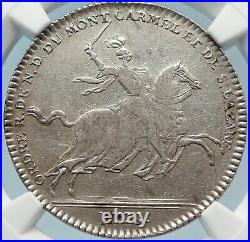
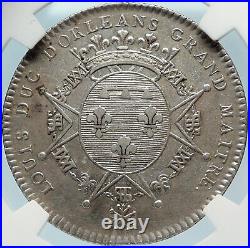
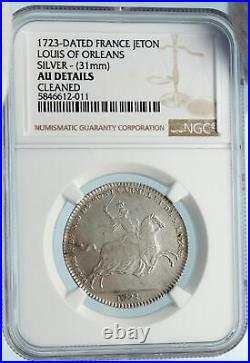
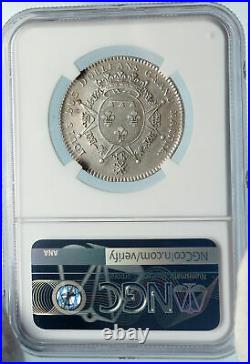
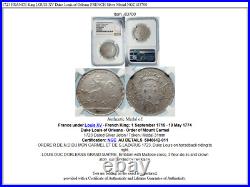

Item: i83700 Authentic Medal of. French King: 1 September 1715 - 10 May 1774 Duke Louis of Orleans - Order of Mount Carmel 1723 Dated Silver Jeton / Token / Medal 31mm Certification: NGC. AU DETAILS 5846612-011 ORDRE R. MON CARMEL ET DE S.
LAZARUS 1723, Duke Louis on horseback riding to right. LOUIS DUC DORLEANS GRAND MAITRE, Emblem with Maltese cross, 3 fleur-de-lis and crown atop, surrounded by necklace. Louis, Duke of Orléans (4 August 1703 - 4 February 1752) was a member of the royal family of France, the House of Bourbon, and as such was a prince du sang.
At his father's death, he became the First Prince of the Blood (Premier Prince du Sang). Known as Louis le Pieux and also as Louis le Génovéfain, Louis was a pious, charitable and cultured prince, who took very little part in the politics of the time. Louis d'Orléans was born at the Palace of Versailles in 1703 to Philippe II, Duke of Orléans and his wife, Françoise Marie de Bourbon, the youngest legitimised daughter of Louis XIV and of his mistress Madame de Montespan. He was the only son of eight children, and at his birth, he was given the courtesy title of Duke of Chartres as the heir to the Orléans fortune and titles.
His maternal grandfather, the king, in addition gave him the pension reserved for the First Prince of the Blood, a rank he was not yet eligible to hold. He was brought up by his mother and his grandmother, Elizabeth Charlotte of the Palatinate, and tutored by Nicolas-Hubert Mongault, the illegitimate son of Jean-Baptiste Colbert de Saint-Pouange, a cousin of Jean-Baptiste Colbert, Louis XIV's minister. He was very close to his mother, the two remaining close till her death in 1749. Louis was very close to his younger sister Louise Élisabeth d'Orléans, who was to become Queen of Spain for seven months in 1724. He was not, however, close to his older sister, Charlotte Aglaé d'Orléans, the wife of Francesco d'Este, Duke of Modena. They were in frequent conflict during her many return visits to the French court from Modena. Upon the death of his maternal grandfather Louis XIV in 1715, his father (the old king's nephew) was selected to be the regent of the country for the five-year-old new king, Louis XV. The court was moved to Paris so his father could govern the country with the young king close by his side. Louis XV was installed in the Palais du Louvre opposite the Palais-Royal, the Paris home of the Orléans family. During the regency, Orléans was seen as the "third personage of the kingdom" immediately after Louis XV and his own father, the Regent. He was formally admitted to the Conseil de Régence on 30 January 1718. Despite his father's wishes, though, Orléans was never to play an overly public or political role in France.The following year, he was made the governor of the Dauphiné. In 1720, he became Grand Master of the Order of Saint-Lazare and Jerusalem. In 1721, under his father's influence, he was named Colonel général de l'Infanterie and held that post until 1730.
Upon the death of his father on 2 December 1723, the twenty-year-old Louis assumed the hereditary title of Duke of Orléans and became the head of the House of Orléans. He also became the next in line to the throne of France until the birth of Louis XV's first-born son in 1729. This was because King Philip V of Spain, the second son of the Grand Dauphin and uncle of the young king, had renounced his rights to the French throne for himself, and his descendants, upon his accession to the throne of Spain in 1700. Although the Regent had hoped that his son would assume as prominent a role in government as he had, the post of prime minister went to Louis' older cousin, Louis Henri, Duke of Bourbon, when the Regent died.
Constantly trying to consolidate and maintain his power at court, the Duke of Bourbon was always suspicious of Louis' motivations and was frequently opposed to him. In 1723, Orléans was conspicuous for his hostility to the former prime minister, Cardinal Dubois. Jetons or jettons are tokens or coin-like medals produced across Europe from the 13th through the 17th centuries. They were produced as counters for use in calculation on a counting board, a lined board similar to an abacus.Thousands of different jetons exist, mostly of religious and educational designs, as well as portraits, the last of which most resemble coinage, somewhat similar to modern, non-circulation commemorative coins. The spelling "jeton" is from the French; the English spell it "jetton". Louis XV (15 February 1710 - 10 May 1774), known as Louis the Beloved , was a monarch of the House of Bourbon who ruled as King of France from 1 September 1715 until his death in 1774.
He succeeded his great-grandfather Louis XIV at the age of five. Until he reached maturity (then defined as his 13th birthday) on 15 February 1723, the kingdom was ruled by Philippe II, Duke of Orleans, as Regent of France. Cardinal Fleury was his chief minister from 1726 until the Cardinal's death in 1743, at which time the young king took sole control of the kingdom. He ceded New France in North America to Spain and Great Britain at the conclusion of the disastrous Seven Years' War in 1763. He incorporated the territories of the Duchy of Lorraine and the Corsican Republic into the Kingdom of France.He was succeeded in 1774 by his grandson Louis XVI, who was executed by guillotine during the French Revolution. Two of his other grandsons, Louis XVIII and Charles X, occupied the throne of France after the fall of Napoleon I. Historians generally give his reign very low marks, especially as wars drained the treasury and set the stage for the governmental collapse and French Revolution in the 1780s. France, officially the French Republic (French: République française), is a sovereign state comprising territory in western Europe and several overseas regions and territories.
The European part of France, called Metropolitan France, extends from the Mediterranean Sea to the English Channel and the North Sea, and from the Rhine to the Atlantic Ocean. France spans 640,679 square kilometres (247,368 sq mi) and has a total population of 67 million. It is a unitary semi-presidential republic with the capital in Paris, the country's largest city and main cultural and commercial centre. The Constitution of France establishes the state as secular and democratic, with its sovereignty derived from the people.
During the Iron Age, what is now Metropolitan France was inhabited by the Gauls, a Celtic people. The Gauls were conquered in 51 BC by the Roman Empire, which held Gaul until 486. The Gallo-Romans faced raids and migration from the Germanic Franks, who dominated the region for hundreds of years, eventually creating the medieval Kingdom of France. France emerged as a major European power in the Late Middle Ages, with its victory in the Hundred Years' War (1337 to 1453) strengthening French state-building and paving the way for a future centralized absolute monarchy. During the Renaissance, France experienced a vast cultural development and established the beginning of a global colonial empire. The 16th century was dominated by religious civil wars between Catholics and Protestants (Huguenots).France became Europe's dominant cultural, political, and military power under Louis XIV. French philosophers played a key role in the Age of Enlightenment during the 18th century. In 1778, France became the first and the main ally of the new United States in the American Revolutionary War.
In the late 18th century, the absolute monarchy was overthrown in the French Revolution. Among its legacies was the Declaration of the Rights of Man and of the Citizen, one of the earliest documents on human rights, which expresses the nation's ideals to this day.France became one of modern history's earliest republics until Napoleon took power and launched the First French Empire in 1804. Fighting against a complex set of coalitions during the Napoleonic Wars, he dominated European affairs for over a decade and had a long-lasting impact on Western culture. Following the collapse of the Empire, France endured a tumultuous succession of governments: the monarchy was restored, it was replaced in 1830 by a constitutional monarchy, then briefly by a Second Republic, and then by a Second Empire, until a more lasting French Third Republic was established in 1870. By the 1905 law, France adopted a strict form of secularism, called laïcité, which has become an important federative principle in the modern French society. France reached its territorial height during the 19th and early 20th centuries, when it ultimately possessed the second-largest colonial empire in the world.
In World War I, France was one of the main winners as part of the Triple Entente alliance fighting against the Central Powers. France was also one of the Allied Powers in World War II, but came under occupation by the Axis Powers in 1940. Following liberation in 1944, a Fourth Republic was established and later dissolved in the course of the Algerian War. The Fifth Republic, led by Charles de Gaulle, was formed in 1958 and remains to this day. Following World War II, most of the empire became decolonized. Throughout its long history, France has been a leading global center of culture, making significant contributions to art, science, and philosophy.It hosts Europe's third-largest number of cultural UNESCO World Heritage Sites (after Italy and Spain) and receives around 83 million foreign tourists annually, the most of any country in the world. France remains a great power with significant cultural, economic, military, and political influence. It is a developed country with the world's sixth-largest economy by nominal GDP and eight-largest by purchasing power parity. According to Credit Suisse, France is the fourth wealthiest nation in the world in terms of aggregate household wealth. It also possesses the world's second-largest exclusive economic zone (EEZ), covering 11,035,000 square kilometres (4,261,000 sq mi).
French citizens enjoy a high standard of living, and the country performs well in international rankings of education, health care, life expectancy, civil liberties, and human development. France is a founding member of the United Nations, where it serves as one of the five permanent members of the UN Security Council.
It is a member of the Group of 7, North Atlantic Treaty Organization (NATO), Organisation for Economic Co-operation and Development (OECD), the World Trade Organization (WTO), and La Francophonie. France is a founding and leading member state of the European Union (EU). World-renowned expert numismatist, enthusiast, author and dealer in authentic ancient Greek, ancient Roman, ancient Byzantine, world coins & more. Ilya Zlobin is an independent individual who has a passion for coin collecting, research and understanding the importance of the historical context and significance all coins and objects represent. Send me a message about this and I can update your invoice should you want this method. Getting your order to you, quickly and securely is a top priority and is taken seriously here.Great care is taken in packaging and mailing every item securely and quickly. What is a certificate of authenticity and what guarantees do you give that the item is authentic? You will be very happy with what you get with the COA; a professional presentation of the coin, with all of the relevant information and a picture of the coin you saw in the listing. Additionally, the coin is inside it's own protective coin flip (holder), with a 2x2 inch description of the coin matching the individual number on the COA.
Whether your goal is to collect or give the item as a gift, coins presented like this could be more prized and valued higher than items that were not given such care and attention to. When should I leave feedback?Please don't leave any negative feedbacks, as it happens sometimes that people rush to leave feedback before letting sufficient time for their order to arrive. The matter of fact is that any issues can be resolved, as reputation is most important to me.
My goal is to provide superior products and quality of service. How and where do I learn more about collecting ancient coins? Visit the Guide on How to Use My Store. For on an overview about using my store, with additional information and links to all other parts of my store which may include educational information on topics you are looking for.
This item is in the category "Coins & Paper Money\Exonumia\Medals". The seller is "highrating_lowprice" and is located in this country: US. This item can be shipped worldwide.
- Country/Region of Manufacture: France
- Composition: Silver
- Type: Medal
- Exonumia Type: Medals
- Denomination: Denomination_in_description
- Year: Year_in_description
